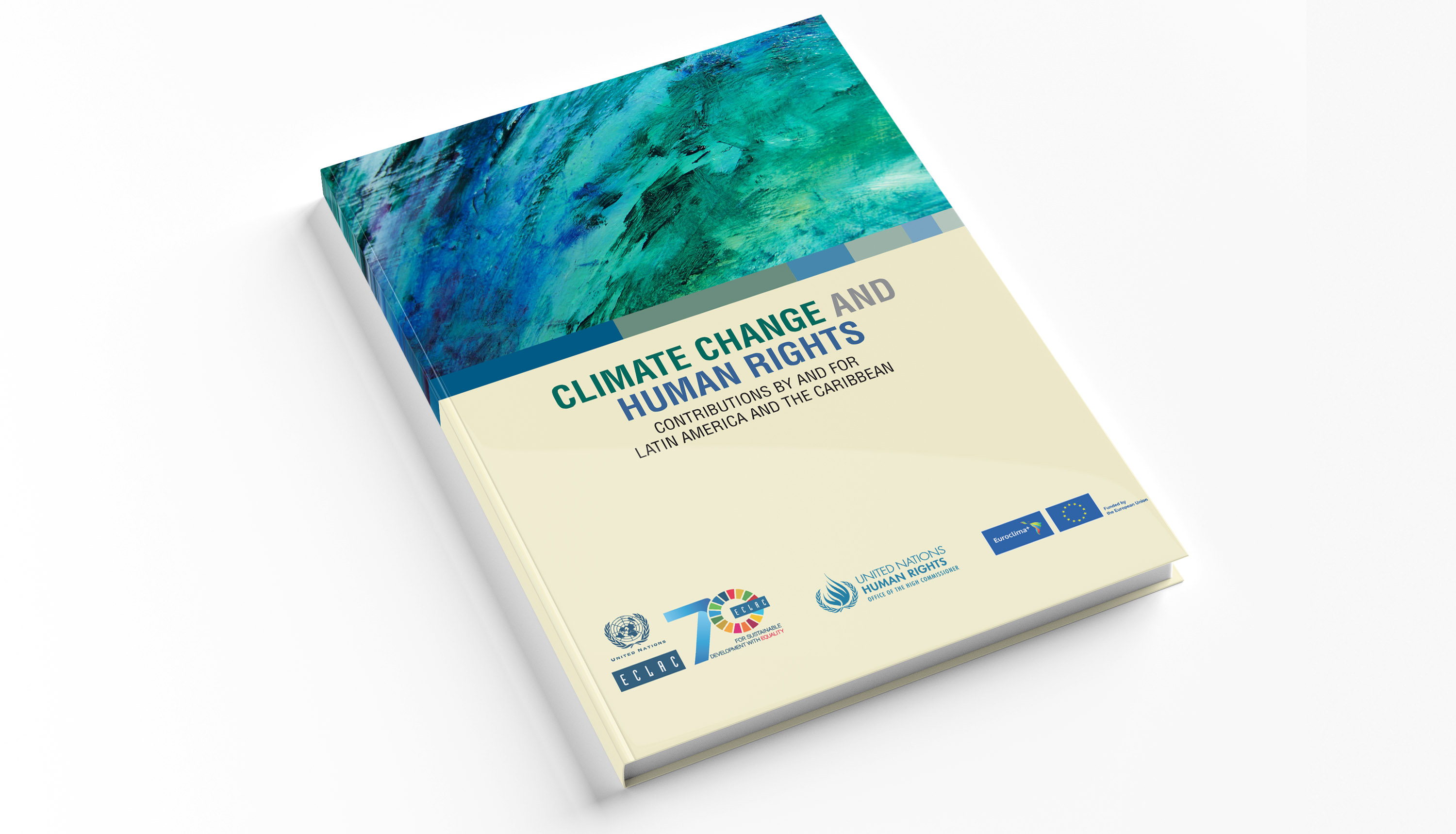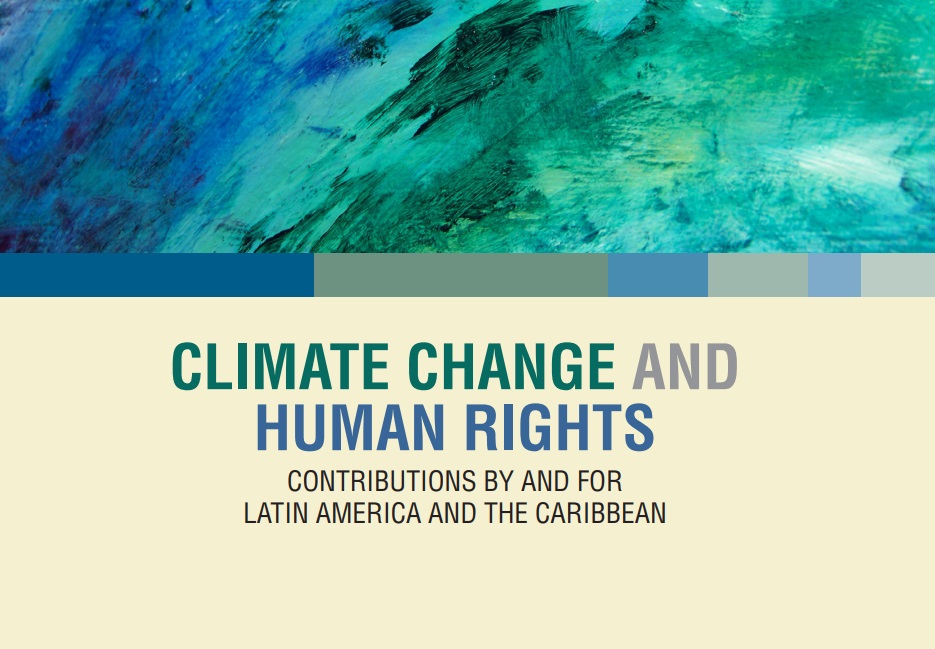ECLAC and OHCHR Warn about the Grave Human Rights Impact of Climate Change
Work area(s)
In a joint publication, the organizations highlighted the Escazú Agreement as a valuable regional contribution for ensuring that actions related to the environment and climate respect, protect and effectively fulfill human rights and basic democratic principles.

Climate change represents a tangible threat to the full and effective exercise of human rights, and its effects are disproportionately more acute in countries and population segments that are already at a disadvantage, according to the book Climate Change and Human Rights: Contributions from and for Latin America and the Caribbean (Spanish only, English version forthcoming) published jointly by the Economic Commission for Latin America and the Caribbean (ECLAC) and the Office of the United Nations High Commissioner for Human Rights (OHCHR).
The document was presented on Monday, December 9 in the context of the 25th Conference of the Parties to the United Nations Framework Convention on Climate Change (COP25), which is being held in Madrid, Spain, with the presence of the UN High Commissioner for Human Rights, Michelle Bachelet, and the Director of ECLAC’s Sustainable Development and Human Settlements Division, Joseluis Samaniego – who acted on behalf of the regional commission’s Executive Secretary, Alicia Bárcena – as well as other authorities.
ECLAC’s most senior representative sent a video greeting in which she reinforced that climate change is the biggest market failure in history and the maximum expression of intergenerational inequality.
“Our region is very familiar with its impact. All of our countries, particularly in Central America and the Caribbean, are already heavily affected by climate variations, increased temperatures, the rising seas, ocean acidification, and the greater intensity and frequency of climate change-related catastrophes,” she stated.
Alicia Bárcena added that, given the challenge of climate change, it is essential that “we place equality and human rights at the center of our actions. We must not forget that the climate crisis is also a human rights crisis.”
The report indicates that, in accordance with international human rights standards, climate action must take into account and ensure the respect for and protection and realization of the rights of all people, in particular those who are most vulnerable.
It warns that the harmful consequences of climate change affect all human rights. Global warming not only has an impact on the right to health, food, water, culture, development and adequate housing; it also threatens people’s very survival and their right to life and physical integrity.
Furthermore, the rising sea level and increased water temperatures, the melting of the poles and glaciers, the increased frequency of heat waves and other phenomena involving extreme heat, heavy precipitation and growing droughts, and the increase in disasters produced by global warming serve to significantly reduce the protection, promotion and full exercise of human rights.
The book stresses that the dramatic consequences of climate change are even more acute for people and groups in situations of vulnerability – including women, indigenous peoples, children, young people, migrants, persons with disabilities, coastal communities and low-income groups – which find themselves disproportionately affected.
That is why climate action must be coherent with human rights obligations, standards and principles, it adds.
“States have the obligation to respect, protect, effectively fulfill and promote all human rights for all people on an equal and non-discriminatory basis. Therefore, they should take proactive measures to prevent the human rights infringements caused by climate change, including foreseeable long-term damage,” the document emphasizes.
With regard to Latin America and the Caribbean, the book warns that although the region is less responsible for the causes of climate change, it is highly vulnerable to its effects.
It highlights the region’s contributions to the link between climate change and human rights, in particular the Regional Agreement on Access to Information, Public Participation and Justice in Environmental Matters in Latin America and the Caribbean, known as the Escazú Agreement, which represents a valuable regional contribution for ensuring that actions related to the environment and climate respect, protect and effectively fulfill human rights and basic democratic principles.
However, despite significant progress, the region still faces important challenges.
“Not only must the region’s countries fully comply with their international, regional and national obligations regarding human rights and climate change; they must also ensure that actions taken on the ground are effective and adequately financed, while contemplating all sectors of society, in particular those in situations of greater risk,” the text indicates.
It further adds that, since Latin America and the Caribbean is one of the most dangerous regions for human rights defenders in environmental matters, it must also continue fighting with determination against the deplorable pattern of harassment, attacks, threats and intimidation against those who defend our shared environment.
“We hope that the region of Latin America and the Caribbean stays at the vanguard of climate action based on human rights,” the document concludes.
Related content

UNFCCC COP25: Launching of book "Climate change and human rights: contributions by and for Latin America and the Caribbean"
During the session, the book "Climate change and human rights: contributions by and for Latin America and the Caribbean" will be launched. This is a joint publication by the United Nations Economic…
Type
Country(ies)
- Latin America and the Caribbean